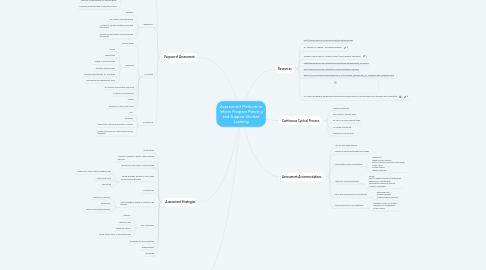
1. Purpose of Assessment
1.1. -appropriate assessment tools
1.1.1. -for
1.1.2. -as
1.1.3. -of
1.1.4. -common understanding of learning goals
1.1.5. common understanding of success criteria
1.2. -diagnostic
1.2.1. -baseline
1.2.2. -to create a learning profile
1.2.3. -in order to provide targeted, effective instruction
1.2.4. -to plan differentiated and personlized instruction
1.3. -formative
1.3.1. -various types
1.3.2. -feedback
1.3.2.1. -timely
1.3.2.2. -descriptive
1.3.2.3. -linked to learning goals
1.3.2.4. -multiple opportunities
1.3.2.5. -provide opportunities for follow-up
1.3.2.6. -developing self-assessment skills
1.3.3. -to confirm instructional practices
1.3.4. -to perform gap analysis
1.3.5. -reflect
1.3.6. -to plan for future instruction
1.4. -summative
1.4.1. -fair
1.4.2. -accurate
1.4.3. -assess only curriciluar elements covered
1.4.4. -informs planning for future instructional segments
2. Assessment Strategies
2.1. -observation
2.2. -provide a variety of ways to demonstrate learning
2.3. -whole and small group conversations
2.4. -asking strategic questions that make student learning visible
2.4.1. -range from lower order to higher order
2.4.2. -closed and open
2.4.3. -think time
2.5. -conferences
2.6. -use techniques where all students can respond
2.6.1. -electronic systems
2.6.2. -thumbs up
2.6.3. -whole hand voting systems
2.7. -self reflections
2.7.1. -journals
2.7.2. -learning logs
2.7.3. -sentence frames
2.7.4. -using sticky notes to annotate work
2.8. Pedagogical Documentation
2.9. -presentations
2.10. -portfolios
3. Student Involvement
3.1. -where is the learner now?
3.2. -where is the learner going?
3.3. -how is the learner going to get there?
4. Resources
4.1. http://www.oafccd.com/documents/educationforall.pdf
4.2. Dr. Janette M. Hughes - Assessing Reading
4.3. Teacher Assessment of Student Needs | Teach Special Education
4.4. http://www.edu.gov.on.ca/eng/document/policy/os/onschools_2017e.pdf
4.5. http://www.edu.gov.on.ca/eng/policyfunding/growsuccess.pdf
4.6. https://ccsso.org/sites/default/files/2017-12/Formative_Assessment_for_Students_with_Disabilities.pdf
4.7. No Child Left Behind: Determining Appropriate Assessment Accommodations for Students with Disabilities
5. Continuous Cyclical Process
5.1. -classroom teacher
5.2. -by in-school support team
5.3. -by out-of-school support team
5.4. -on-going monitoring
5.5. -responsive intervention
6. Assessment Accommodations
6.1. -do not alter expectations
6.2. -based on learning strengths and needs
6.3. -presentation accommodations
6.3.1. Large Print Magnification Devices Text-to-Speech Assistive Technology Audio Tapes Screen Reader Talking Materials
6.4. -response accommodations
6.4.1. Scribe Text-to Speech Assistive Technology Respond on Test Booklet Spelling and Grammar devices Graphic Organizers
6.5. -time and scheduling accomodations
6.5.1. Extended time Frequent Breaks Multiple testing sessions
6.6. -environmental accommodations
6.6.1. Change of room or location Earphone or headphones Study carrels
